 After
publishing over 350 blog articles about all aspects of digital photography, it
can be a struggle to come up with fresh topics that I haven’t covered in with
nauseating detail in the past. It has been a lot of words, but as I
review many of the articles it becomes apparent that most can be distilled down
to one or two key “take away” points.
After
publishing over 350 blog articles about all aspects of digital photography, it
can be a struggle to come up with fresh topics that I haven’t covered in with
nauseating detail in the past. It has been a lot of words, but as I
review many of the articles it becomes apparent that most can be distilled down
to one or two key “take away” points.  Over
the last few weeks I have been out shooting in some different and exciting
places. I look forward to sharing many of the resulting images, but, as I
continue to experience new surroundings, I thought it would be a good
opportunity to reprise a few of my favorite “take always”. As I began
assembling these quick little secrets of photography and link to related
articles, the list seemed to grow beyond control. To get started, here
then are just few of my quick take-always, Not necessarily the best, in no
particular order and, for those few who read my blog, nothing new, but still
worthy of emphasis.
Over
the last few weeks I have been out shooting in some different and exciting
places. I look forward to sharing many of the resulting images, but, as I
continue to experience new surroundings, I thought it would be a good
opportunity to reprise a few of my favorite “take always”. As I began
assembling these quick little secrets of photography and link to related
articles, the list seemed to grow beyond control. To get started, here
then are just few of my quick take-always, Not necessarily the best, in no
particular order and, for those few who read my blog, nothing new, but still
worthy of emphasis.
1)
Have
something interesting and clear in the foreground on foggy days.
 I love the sense of mystery that fog
and mist create in an image. Fog can also enhance a feeling of depth,
especially when nearby elements are seen clearly against a soft distant
background. When I approach a foggy scene, my first thought is to find
something interesting in the foreground.
I love the sense of mystery that fog
and mist create in an image. Fog can also enhance a feeling of depth,
especially when nearby elements are seen clearly against a soft distant
background. When I approach a foggy scene, my first thought is to find
something interesting in the foreground.
2)
Avoid
Infrared pictures of people.
 About six years ago I converted my old Canon 20D to shoot
infrared. It opened a whole new way of seeing. The greens of
foliage were transformed to a snowy white and the sky became an Inky black.
It has been great fun exploring the world in an entirely different
spectrum of light, but I learned one painful lesson. Unless your goal is
to create zombie portraits, you should avoid using infrared for pictures of
people. Infrared makes skin appear ghostly pale and devoid of life.
Even worse are the eyes which are rendered in a fathomless black.
Leave your infrared camera at home on your wedding shoots.
About six years ago I converted my old Canon 20D to shoot
infrared. It opened a whole new way of seeing. The greens of
foliage were transformed to a snowy white and the sky became an Inky black.
It has been great fun exploring the world in an entirely different
spectrum of light, but I learned one painful lesson. Unless your goal is
to create zombie portraits, you should avoid using infrared for pictures of
people. Infrared makes skin appear ghostly pale and devoid of life.
Even worse are the eyes which are rendered in a fathomless black.
Leave your infrared camera at home on your wedding shoots.
3)
A picture
does not exist until it is in at least three places, at least one off-site.
 If disaster can happen, it will! When it comes to your
precious images there is nothing more certain. Computers crash, hard drives
fail, and, some day, the cloud may simply blow away. Any mode of back-up
is vulnerable, all will fail, but hopefully not all at once. I shoot with
images saved to two different cards within the camera. Before I reuse the
cards, I make sure
If disaster can happen, it will! When it comes to your
precious images there is nothing more certain. Computers crash, hard drives
fail, and, some day, the cloud may simply blow away. Any mode of back-up
is vulnerable, all will fail, but hopefully not all at once. I shoot with
images saved to two different cards within the camera. Before I reuse the
cards, I make sure 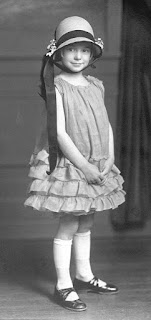 |
| Mom at 7 |
That. Is just my approach. You can have your own plan.
The important thing is to have a plan!
4)
Photograph
Christmas Lights in the Blue Hour.
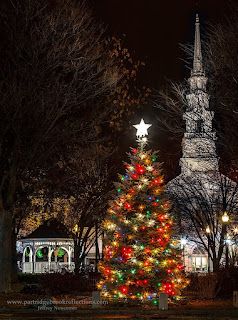 |
| Pretty Lights, Black Sky |
Pictures of nighttime artificial illumination can be magical
at any time of year, but never more warm and exciting as during the holiday
season. I love shooting Christmas lighting and early on I learned one
cardinal rule, shoot during the blue hour. The “Blue Hour”, is that time
just before sunrise or after sunset when the sky retains a lovely blue glow,
but does not obscure the illumination. Lighting photographed in the full
darkness tends to appear as if floating in space without sense ofcontext
provided by the underlying scaffolding of the surrounding, un-illuminated
structures.
Because it stands adjacent to the glorious “Golden Hours” of
sunrise and sunset, the blue hour is generally unappreciated as a time for
photography, but it has its own special magic and never more than when the
Christmas lights decorate the night.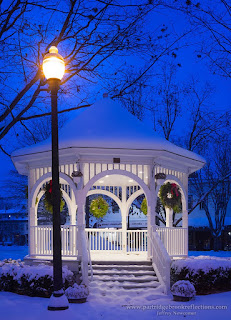

5)
Get the
richest fall foliage colors on overcast days and with a polarizers.
 Many people think that the best time to capture the glory of
autumn colors is on bright sunny days, but as every photographer knows bright
sunlight is the worst time to see into the depth and richness of fall color.
Intense sunlight reflects off the glossy foliage and blocks the rich colors
underneath. My favorite time to shoot autumn color is on
Many people think that the best time to capture the glory of
autumn colors is on bright sunny days, but as every photographer knows bright
sunlight is the worst time to see into the depth and richness of fall color.
Intense sunlight reflects off the glossy foliage and blocks the rich colors
underneath. My favorite time to shoot autumn color is on  overcast days
when the light is soft and comes from all directions. It is like a giant
soft box. The light may have a slight blue tint, but that is easy to
correct in post. When I can’t avoid the brilliant light, I look for shade
or use a polarizing filter to mute the directional illumination.
overcast days
when the light is soft and comes from all directions. It is like a giant
soft box. The light may have a slight blue tint, but that is easy to
correct in post. When I can’t avoid the brilliant light, I look for shade
or use a polarizing filter to mute the directional illumination.
Jeff Newcomer
partridgebrookreflections.com
603-363-8338

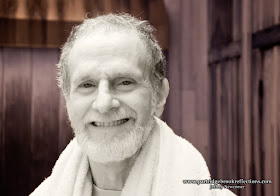

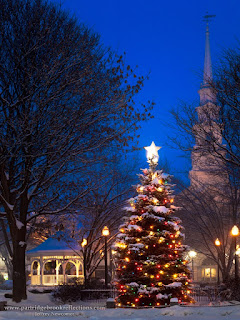

Nice article and thanks for sharing your knowledge. I really appropriate your views.
ReplyDeleteCanon EF 100-400mm f/4.5-5.6L IS II USM Lens
its very nice of you to share your secrets to photography with us! you made me feel special and i love the tips you had to offer. p.s stay awesome because you are amazing.
ReplyDelete